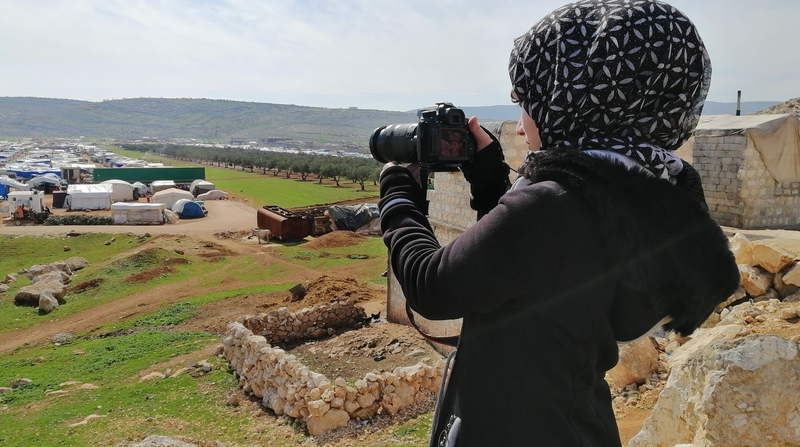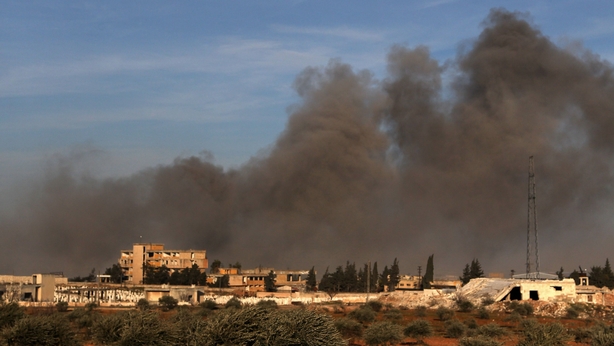
'Close to five million Syrians are now living as refugees beyond the country's borders, but an estimated six million are displaced within their own country, many of whom have had to flee the conflict multiple times.
Half of those displaced are in the northwest, trapped in a shrinking rebel-held area centred around Idlib, that has been battered by months of deadly bombardments.
Among them is 26-year-old Sahar, originally from the southern suburbs outside Idlib where her family home was partially destroyed by airstrikes.
Sahar was just a teenager when the Syrian conflict first began and since then she and her family have had to uproot and flee from the ongoing fighting at least three times.
"I cannot describe those moments, it was one of the hardest moments because we had to leave the house that I was raised in," she recalled.
"We had to leave everything in order to save our lives and my family's lives from murders or arrest because if the régime came they would arrest us and I had been arrested before."
She describes the ongoing fear caused by having to uproot multiple times: "It is a very hard feeling, having to leave everything in order to survive … Now I live in Idlib city centre, which is also not safe because of the air strikes and the bombing towards the civilians."
Sahar’s family was most recently displaced in mid-February and she is currently stuck in Idlib city, amidst the constant threat of air strikes.
"The hardest thing right now that I feel is instability. A huge population crisis happened because citizens from the south suburbs of Idlib had to emigrate to the north, toward Idlib city and the borders."
Sahar is now living with her family in overcrowded conditions near the border with Turkey, uncertain about what the future holds.
"Most people, after they left their homes didn't have any income. This is really a hard thing. Camps for displaced people have really bad conditions. More than one family has to live in the same tent. Sometimes there are four or five families in the one tent which they use as kitchen, bedroom, bathroom and a living room - all in the same tent."
A Russian-Turkish ceasefire deal came into effect last Friday, bringing relative calm to Idlib, its skies free of warplanes for the first day in months,
Like many in the city, Sahar’s main hope is for peace and safety:
"What I wish for is to live peacefully and safely with my family and all the people here in Idlib city … I hope that Syria will become a safe country and that we could live here with dignity."
She added: "We need the support from all the countries in the world, we need the international community to stay by our side.
"Those civilians and children are not involved with anything, we are normal civilians who only want to live in our areas and our homes. Stop the river of blood and get aid to the displacement camps." '
 'Locals call Idlib "the forgotten city", still paying the price for one day in the 1970s when the former president was pelted with tomatoes.
'Locals call Idlib "the forgotten city", still paying the price for one day in the 1970s when the former president was pelted with tomatoes.
The city and its surroundings have suffered furious bombardments since December at the hands of Syrian forces and Russian jets, leaving hundreds dead and forcing huge numbers to flee towards the Turkish border.
With a tentative ceasefire announced on March 6, villager Malek Haj Khalil returned to his home in Sarmin, just east of Idlib, hoping to recover a few belongings from the ruins of his house.
But he found nothing beyond an air conditioning unit and a few broken pans among the twisted iron bars that were once his home.
"We were hoping to find a few things, some furniture or blankets, but there is nothing," he said.
Some neighbours had more success, and were loading gas cookers, mattresses and sofas on to trucks.
"When the army came, it poured out all the hatred it has against us... targeting civilians and their houses," said Khalil.
Idlib was one of the first provinces to join the uprisings against President Bashar al-Assad, and is now the last to remain in rebel hands, but the roots of that "hatred" predate the revolution in 2011.
Tucked in the northwest of the country, Idlib's residents have long felt overlooked by their rulers in Damascus.
Locals and researchers particularly recall the time in the early 1970s when Hafez al-Assad, Bashar's father who ruled from 1971 until his death in 2000, made his first and only visit to Idlib. An angry crowd pelted him with tomatoes and a shoe.
"After that incident, Hafez al-Assad never returned to the city. It has since been cut off, and that shows in the quality of its infrastructure and schools," said Mohammad Sarmini, head of Syrian research centre Jusoor in Istanbul.
"It was this marginalisation that pushed Idlib to join the revolution," he added.
According to Taleb al-Dugheim, a specialist on Syrian history, the slight against Assad senior in Idlib "was never forgotten, and transformed into repression and marginalisation" that continued under his son decades later.
The régime also remembers Idlib's role in the protests of the 1980s, Dugheim said, when many supported a Muslim Brotherhood uprising in the city of Hama that was brutally suppressed.
Asaad Falaha knows the hatred well. He leads a charity running a primary school in Binnish, east of Idlib city, that the régime has bombed three times during the recent offensive.
"Seventy percent of it has been destroyed. To target a school like this shows the hatred of the régime," he said.
The province shelters three million people -- half of them displaced from other regions.
Assad has taken a close interest in the battle to retake it.
"When Bashar al-Assad visited the town of Al-Habit in Idlib province in October, he personally supervised artillery shelling against (the then rebel-held) Maarat al-Numan," said Dugheim.
"The régime acts as though the inhabitants of the Idlib are not really Syrians," he added.
Assad's forces retook the town of Kafranbel in the south of the province in February. It was one of the last standing symbols of the revolution, full of darkly ironic slogans against the régime.
That spirit still shows flickers of life further north in the province: on a partially destroyed school in Binnish, someone has written advice for protecting against the coronavirus, with Assad depicting as the virus.
On the wall of a gutted-out classroom, someone has offered a history lesson: "Date: the era of dictators. Course: revolution. Lesson: death." '


'Ahmed Mansour was a schoolboy with dreams of becoming a lawyer when he joined the first protests at his secondary school in Syria’s northern city of Aleppo.
Nine years later, his studies halted by a war which has ravaged the country his whole adult life, Mansour and fellow fighters are stuck in a shrinking corner of rebel territory which still defies President Bashar al-Assad.
His journey from schoolboy demonstrator to veteran fighter, from early optimism to last-ditch defense in the towns and farmlands of Idlib province, echoes the dashed hopes of many Syrians who took to the streets to challenge authorities.
“I expected the régime to fall,” Mansour said, recalling the early protests inspired by uprisings in North Africa which rapidly toppled autocrats in Tunisia and Egypt and then overthrew Libya’s Muammar Gaddafi after Western intervention.
“It was a corrupt sectarian régime and we had to change it,” he said, flanked by fellow fighters under a canopy of olive trees, hiding them from hostile warplanes and drones in the skies of Idlib.
Starting in Damascus on March 15, 2011, and then in the southern city of Deraa a few days later, unprecedented protests against decades of rule by Assad and his father before him spread across the country.
Mansour, then 16 and studying at secondary school in Aleppo, joined 30 other students in a demonstration at their school. “We shouted ‘Freedom, Freedom, Freedom’,” he said. “Security forces came the next day and arrested 11 of my friends.”
The students were released after mediation. They continued to protest, but in small numbers and in short 15-minute bursts. “We couldn’t do it for longer because security forces came immediately and stormed the demonstration with tear gas and opened fire,” he said.
The Syrian government cracked down with a determination unmatched in other countries caught up in what was briefly labeled the Arab Spring.
Despite growing casualties, protests persisted. As demonstrations became funeral marches, confrontation escalated.
Mansour joined a group to defend the demonstrators, but they could not match the strength of Assad’s security forces. After several months a new force of military defectors and armed rebels was formed, the Free Syrian Army.
“I joined the Free Army with great pride because I was taking part in protecting civilians, our people, our brothers,” he said. “People who were calling for the most basic rights from a tyrannical, repressive, dictatorial régime.”
Syria was on the way to becoming the bloodiest and most protracted of the Arab uprisings, but in the first years of conflict rebel confidence was high. Assad’s foreign critics said his remaining days in power were numbered, and a senior U.S. State Department official described him as “a dead man walking”.
Mansour and the rebels swept into Aleppo in the late summer of 2012, a city they would hold in part for another four years.
Then he was based in towns around Aleppo, surviving a stomach injury from shelling, and fighting for a variety of rebel factions which jostled for power on Syria’s chaotic battlefield.
Riven by division - which worsened dramatically with the emergence of the jihadist Islamic State group in 2013 - and lacking the international support they sought, the rebels failed to capitalize on the early gains.
Islamic State “turned public opinion against us”, leading the outside world to equate the rebel fighters with terrorists.
“Then the Russians came, and changed the balance,” Mansour said, referring to Moscow’s decisive 2015 intervention which turned the war in Assad’s favor.
“They put pressure on us in Aleppo, and then they took control,” he said. “They broke us in Ghouta (around Damascus) and in many areas until at last we ended up in Idlib,” he said, the sound of bombardment occasionally punctuating his comments.
In some of the worst of the fighting in Aleppo’s Khaldiya district, Mansour said one or two fighters died alongside him every day. Another bleak memory was an air strike which killed around 20 of his comrades sheltering in a cave in 2016.
The last few months, as Assad’s Russia-backed forces launched an offensive across southern Idlib, marked the lowest point yet for rebels who once controlled large parts of Syria and almost encircled Damascus.
Only a few days ago, Mansour’s forces were driven from his hometown of Kafr Nabl by the advance of Syrian government forces, halted only by Turkish air strikes, artillery and a ceasefire deal agreed by Turkey and Russia last week.
Turkey’s robust support for the rebels this month has sustained his optimism, despite the string of past military defeats, but also reinforced a sense of betrayal by other international powers.
“The world watched us and no one helped,” Mansour said. “If the world had helped us, we would have toppled the régime”.'






